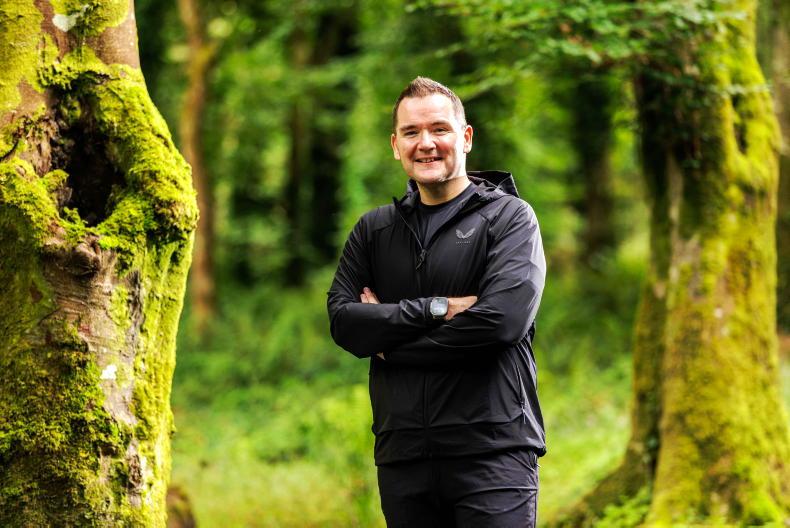The topic of mental health is especially timely at this time of year with many people beginning to feel down, particularly here in Ireland as the clock has just gone back.
Do you find that, like many, the winter months get you down more than you think they should? If so, you may well be suffering from winter blues and you’re not alone. Seasonal affective disorder (SAD Syndrome) also known as ‘winter blues’ is a common pattern of symptoms arising in late autumn and winter and resolving in springtime.
Impacting up to one in every three people, SAD is thought to be up to four times more common in women than in men with age of initial onset of symptoms estimated to be between the ages of 18 and 30 years of age.
Like many conditions there is a wide spectrum of symptoms. At the more severe end are people really actually suffering from clinical depression. They may have marked symptoms of sleep disturbance and persistent low mood, loss of pleasure or interest in hobbies or interests previously enjoyed, feelings of guilt, isolation, helplessness or hopelessness and even thoughts of suicide.
Symptoms like these always require professional support from your doctor or trained therapist.
These feelings are epidemic in Ireland and that’s down to the long winter nights changing your circadian rhythm
More frequently, symptoms are milder with people suffering from low energy, tiredness, oversleeping, changes in the appetite like craving carbohydrates, gaining weight and even feelings of heaviness in their arms and legs.
These feelings are epidemic in Ireland and that’s down to the long winter nights changing your circadian rhythm, disturbing your sleep and making you feel more groggy and down. People tend to feel more irritable and more oversensitive.
While the precise cause of winter blues is unclear, lack of sunlight and natural daylight impacts the brains body clock with reduced levels of various brain chemicals including serotonin levels, which can impact on confidence, self esteem and overall mood. As well as that, the long nights and short days can result in excess melatonin leading to feelings of sluggishness. In turn, this can affect your mood, motivation and overall mojo.
Symptoms of winter blues
In addition to symptoms of severe depression, more common symptoms of winter blues include the following:
Change in sleep pattern, especially tendency to oversleep.Decreased physical activity.Tiredness and reduced energy. Poor concentration.Change in appetite. Cravings for sweet or starchy foods.Weight gain.A heavy feeling in the arms or legs. Avoiding social situations or increased degree of sensitivity to social rejection.Irritability and low mood.Sadness.While some people, particularly those at the more severe end of the spectrum will need medication, for many the answer is not at the end of a prescription bottle. Instead there is an opportunity to address your lifestyle to combat the effects of winter on your body. There are lots of useful lifestyle strategies you can implement to help combat the blues.
Awareness
Understand that you are not bullet proof or immune to the stresses and strains of life. Awareness of the symptoms of winter blues is important. If you are aware that you or somebody close to you is suffering, it can give you the clarity to take action. Knowledge is power to take effective action.
Natural light
LUX is simply a measurement of light and it is suggested that you need 10,000 lux for at least 30 minutes a day for optimal mental and emotional vitality.
Morning light with its blue tinge and shorter wavelength appears to be best.
Even on a bad winter’s day, getting outdoors has health benefits as the outdoors light is always stronger, brighter and so much better for you than indoor artificial light.
A cloudy day may give you 10,000 lux whereas your kitchen will only give you about 500 lux. Some people find the use of ‘light therapy’ helpful using either a full spectrum bright light or a ‘light’ alarm clock.
Exercise
Regular exercise is a fantastic way to boost your mood, bringing on brain-boosting positivity chemicals such as serotonin, oxytocin and dopamine while helping to dissolve feeling of negative stress as a great natural stress buster.
Nutrition
Eating a balanced diet is hugely important at this time of the year. I recommend incorporating good mood food into your daily diet during winter months to boost mood and reset the body clock.
Simply eat more food that is good for you. Specifically in terms of mood, omega 3 fats are extremely helpful.
These fats can be found in nuts, seeds, oily fish, free-range eggs and kale. Feed your microbiome (the 50 trillion or so bugs that live in your gut) that’s now recognised to produce the majority of the body’s happiness boosting hormone serotonin. Eat lots of prebiotics (green vegetables and fibre) and probiotics like Greek yoghurt as well as fermented foods like kefir.
Sleep
Getting enough restorative sleep is so important for your health and wellbeing in so many ways. For most people that means at least seven and a half to eight hours per night. Ensure you have a good sleep routine and keep technology out of your bedroom!
Vitamin D
People with winter blues may produce insufficient levels of vitamin D.
Many people in Ireland lack vitamin D which is activated via sun exposure in the skin and I often recommend a vitamin D supplement. It’s hard to get enough vitamin D in your diet even if you eat a lot of salmon and mushrooms. For most people, 1,000iu daily can be a great addition for your overall health. If you are lucky enough, then some winter sunshine can work wonders as well.
St John’s Wort
(hypericum perforatum)
This herb has been used as a natural stress buster and brain tonic for over 1,000 years. It comes from the hypericum plant which flowers in Irish gardens towards the end of June, which was St John the Baptist’s birthday, hence the name. While in many countries it can be accessed over the counter, in Ireland it is available only on prescription.
It can be very effective for the right person in the right circumstances. While thought to be generally very safe, it can interact with other prescribed medications (including the contraceptive pill) so always check with your doctor beforehand.
We are social creatures
Connect with others
A lot of people tend to go back into their shell when they are feeling depressed or sluggish.
It’s almost a primitive hibernation - retreating back into your cave during winter months. Don’t go back into your cave alone. Reach out and find your tribe. We are social creatures.
The best way to boost your happiness is to focus on someone else, to reach out and support others. A problem shared is a problem halved; it’s good to talk.
Be kinder to yourself
Finally, be kinder to yourself. By that I simply mean investing in your own self care and overall vitality.
Getting to know and understand yourself that little bit better. Committing to be that little bit better to yourself.
Making enough time to attend to your own physical, emotional, relational and mental health needs. Even better by being good to yourself, it enables you to be better to everyone that matters in your life.

Dr Mark Rowe, medical doctor, author and speaker photographed in his Waterford Wellness Park. \ Barry Cronin
Dr Mark Rowe, GP, author and life strategist. Follow Dr Mark Rowe on Twitter, Linkedin, Facebook, Instagram on @drmarkrowe
The topic of mental health is especially timely at this time of year with many people beginning to feel down, particularly here in Ireland as the clock has just gone back.
Do you find that, like many, the winter months get you down more than you think they should? If so, you may well be suffering from winter blues and you’re not alone. Seasonal affective disorder (SAD Syndrome) also known as ‘winter blues’ is a common pattern of symptoms arising in late autumn and winter and resolving in springtime.
Impacting up to one in every three people, SAD is thought to be up to four times more common in women than in men with age of initial onset of symptoms estimated to be between the ages of 18 and 30 years of age.
Like many conditions there is a wide spectrum of symptoms. At the more severe end are people really actually suffering from clinical depression. They may have marked symptoms of sleep disturbance and persistent low mood, loss of pleasure or interest in hobbies or interests previously enjoyed, feelings of guilt, isolation, helplessness or hopelessness and even thoughts of suicide.
Symptoms like these always require professional support from your doctor or trained therapist.
These feelings are epidemic in Ireland and that’s down to the long winter nights changing your circadian rhythm
More frequently, symptoms are milder with people suffering from low energy, tiredness, oversleeping, changes in the appetite like craving carbohydrates, gaining weight and even feelings of heaviness in their arms and legs.
These feelings are epidemic in Ireland and that’s down to the long winter nights changing your circadian rhythm, disturbing your sleep and making you feel more groggy and down. People tend to feel more irritable and more oversensitive.
While the precise cause of winter blues is unclear, lack of sunlight and natural daylight impacts the brains body clock with reduced levels of various brain chemicals including serotonin levels, which can impact on confidence, self esteem and overall mood. As well as that, the long nights and short days can result in excess melatonin leading to feelings of sluggishness. In turn, this can affect your mood, motivation and overall mojo.
Symptoms of winter blues
In addition to symptoms of severe depression, more common symptoms of winter blues include the following:
Change in sleep pattern, especially tendency to oversleep.Decreased physical activity.Tiredness and reduced energy. Poor concentration.Change in appetite. Cravings for sweet or starchy foods.Weight gain.A heavy feeling in the arms or legs. Avoiding social situations or increased degree of sensitivity to social rejection.Irritability and low mood.Sadness.While some people, particularly those at the more severe end of the spectrum will need medication, for many the answer is not at the end of a prescription bottle. Instead there is an opportunity to address your lifestyle to combat the effects of winter on your body. There are lots of useful lifestyle strategies you can implement to help combat the blues.
Awareness
Understand that you are not bullet proof or immune to the stresses and strains of life. Awareness of the symptoms of winter blues is important. If you are aware that you or somebody close to you is suffering, it can give you the clarity to take action. Knowledge is power to take effective action.
Natural light
LUX is simply a measurement of light and it is suggested that you need 10,000 lux for at least 30 minutes a day for optimal mental and emotional vitality.
Morning light with its blue tinge and shorter wavelength appears to be best.
Even on a bad winter’s day, getting outdoors has health benefits as the outdoors light is always stronger, brighter and so much better for you than indoor artificial light.
A cloudy day may give you 10,000 lux whereas your kitchen will only give you about 500 lux. Some people find the use of ‘light therapy’ helpful using either a full spectrum bright light or a ‘light’ alarm clock.
Exercise
Regular exercise is a fantastic way to boost your mood, bringing on brain-boosting positivity chemicals such as serotonin, oxytocin and dopamine while helping to dissolve feeling of negative stress as a great natural stress buster.
Nutrition
Eating a balanced diet is hugely important at this time of the year. I recommend incorporating good mood food into your daily diet during winter months to boost mood and reset the body clock.
Simply eat more food that is good for you. Specifically in terms of mood, omega 3 fats are extremely helpful.
These fats can be found in nuts, seeds, oily fish, free-range eggs and kale. Feed your microbiome (the 50 trillion or so bugs that live in your gut) that’s now recognised to produce the majority of the body’s happiness boosting hormone serotonin. Eat lots of prebiotics (green vegetables and fibre) and probiotics like Greek yoghurt as well as fermented foods like kefir.
Sleep
Getting enough restorative sleep is so important for your health and wellbeing in so many ways. For most people that means at least seven and a half to eight hours per night. Ensure you have a good sleep routine and keep technology out of your bedroom!
Vitamin D
People with winter blues may produce insufficient levels of vitamin D.
Many people in Ireland lack vitamin D which is activated via sun exposure in the skin and I often recommend a vitamin D supplement. It’s hard to get enough vitamin D in your diet even if you eat a lot of salmon and mushrooms. For most people, 1,000iu daily can be a great addition for your overall health. If you are lucky enough, then some winter sunshine can work wonders as well.
St John’s Wort
(hypericum perforatum)
This herb has been used as a natural stress buster and brain tonic for over 1,000 years. It comes from the hypericum plant which flowers in Irish gardens towards the end of June, which was St John the Baptist’s birthday, hence the name. While in many countries it can be accessed over the counter, in Ireland it is available only on prescription.
It can be very effective for the right person in the right circumstances. While thought to be generally very safe, it can interact with other prescribed medications (including the contraceptive pill) so always check with your doctor beforehand.
We are social creatures
Connect with others
A lot of people tend to go back into their shell when they are feeling depressed or sluggish.
It’s almost a primitive hibernation - retreating back into your cave during winter months. Don’t go back into your cave alone. Reach out and find your tribe. We are social creatures.
The best way to boost your happiness is to focus on someone else, to reach out and support others. A problem shared is a problem halved; it’s good to talk.
Be kinder to yourself
Finally, be kinder to yourself. By that I simply mean investing in your own self care and overall vitality.
Getting to know and understand yourself that little bit better. Committing to be that little bit better to yourself.
Making enough time to attend to your own physical, emotional, relational and mental health needs. Even better by being good to yourself, it enables you to be better to everyone that matters in your life.

Dr Mark Rowe, medical doctor, author and speaker photographed in his Waterford Wellness Park. \ Barry Cronin
Dr Mark Rowe, GP, author and life strategist. Follow Dr Mark Rowe on Twitter, Linkedin, Facebook, Instagram on @drmarkrowe











SHARING OPTIONS